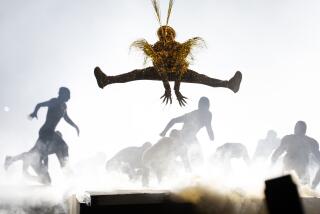THE OLYMPICS: WINTER GAMES AT ALBERTVILLE : The World Celebrates Its Rebirth : Ceremony: Athletes from newly independent nations, reunited Germany create special atmosphere at opening.
- Share via
ALBERTVILLE, France — Beneath the snow-capped French Alps, where even a small, grimy industrial town could masquerade in the twilight as a winter wonderland, there was a new-age ceremony Saturday to celebrate the first Olympics of the new world order.
Parading into Albertville’s open-air theater on the first day of the 16th Winter Olympics before a capacity crowd of 33,000, including French President Francois Mitterand and U.S. Vice President Dan Quayle, were athletes from 64 countries, seven more than participated four years ago at Calgary.
Among those were five nations that recently won their independence as a result of the collapse of communism in Eastern Europe, including the former Soviet republics of Estonia, Latvia and Lithuania, which have not entered the Olympics under their own flags since before World War II, and the former Yugoslav republics of Croatia and Slovenia.
Five other republics from the former Soviet Union with athletes in the Winter Games marched en masse behind the five rings of the Olympic flag. But, although identified as the Unified Team, their independence also was recognized as each athlete carried a small flag from his or her republic.
Unified in more than name only were the Germans, East and West, who marched side-by-side as representatives of the same nation for the first time in the Olympics since 1936. A former East German, bobsledder Wolfgang Hoppe, carried reunified Germany’s flag, which formerly flew over West Germany.
Carrying the flag for the United States was cross-country skier Bill Koch, a 36-year-old, four-time Olympian from Underwood, Wash., who said before the opening ceremony that he might ignore a time-honored tradition and dip the U.S. flag to a foreign head-of-state, Mitterand in this case, as a statement on behalf of a one-world society.
No U.S. flag-bearer has dipped the flag to a foreign head-of-state since Ralph Rose, an Irish-American shotputter from California, was so incensed by England’s refusal to allow Ireland to display its own flag during the opening ceremony of the 1908 Summer Olympics at London that he chose not to acknowledge the King of England when the U.S. team marched past the royal box.
“This flag dips to no earthly king,” Rose reportedly said.
Calling that attitude arrogant, Koch said: “We’re the strongest nation on earth. We want to be good world citizens. I think we could do better. A dip demonstrates a little humility.”
He said that he had the support of many other U.S. athletes, but two who met with him late Saturday afternoon persuaded him that the majority was against breaking with tradition. Koch marched past Mitterand without dipping the flag.
Unlike the opening ceremony for the 1988 Summer Olympics at Seoul, where the United States was criticized for its unruly behavior, this U.S. team, the largest in the Olympics with 181 athletes, was well-disciplined.
“Of course, we were very embarrassed by protocol lapses in Seoul,” U.S. team leader Chuck Foster of Duxbury, Mass., said before the ceremony. “We have been working on procedures so this won’t happen again. The athletes have been asked to show great respect. They’re representing themselves, their families and the country, in that order, and they should do so with dignity.”
The ceremony, however, was not without levity.
As each team entered the stadium, it was identified over the public address system by a poem styled after the writings of Dr. Seuss, such as:
“Bronze, silver and gold,
oh what glittering fates
for the team from the United States.”
Or:
“Competing with grace,
winning so prettily,
that’s the style
of the team from Italy.”
After the athletes had marched around the stadium and found their seats among the crowd to watch the remainder of the ceremony, the Canadian team started the “wave.” Perhaps taking their cue from Cuban President Fidel Castro during the Pan American Games at Havana, Mitterand, Quayle and International Olympic Committee President Juan Antonio Samaranch soon joined in the exercise.
They no doubt needed it to remain warm. The temperature in Albertville, a charmless town of 18,000 that serves as the commercial and industrial center for the 640-square mile area of the Savoy region in which the Games will be held over the next 15 days, was so warm during the late afternoon that the flag-bearer from Bermuda did not look out of place in his yellow walking shorts. But when the sun set behind the Alps, the temperature dropped rapidly.
But this, after all, is the Winter Olympics. Mitterand officially proclaimed the Games open; former French soccer star Michel Platini carried the torch into the stadium, where he handed it to a young boy to ignite the flame; and France’s European champion figure skater, Surya Bonaly, recited the athletes’ oath. An 11-year-old girl stood on a platform as it was hoisted about 30 feet; she then sang the French national anthem, “La Marseillaise,” without accompaniment.
The subsequent show brought to mind Montreal’s Cirque du Soleil, featuring acrobats, gymnasts, dancers and new age music to create an atmosphere that was both bizarre and enchanting.
More to Read
Go beyond the scoreboard
Get the latest on L.A.'s teams in the daily Sports Report newsletter.
You may occasionally receive promotional content from the Los Angeles Times.






